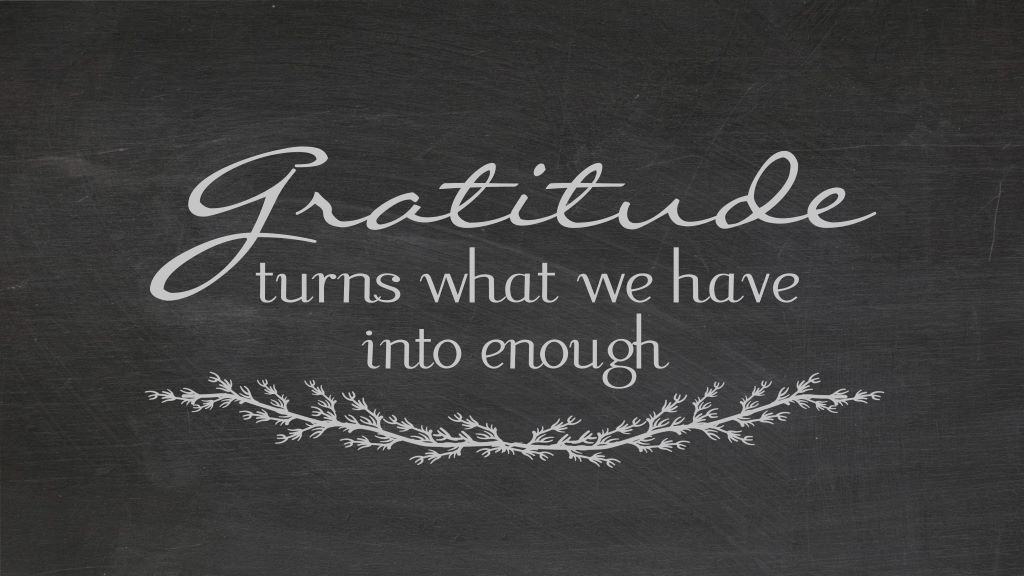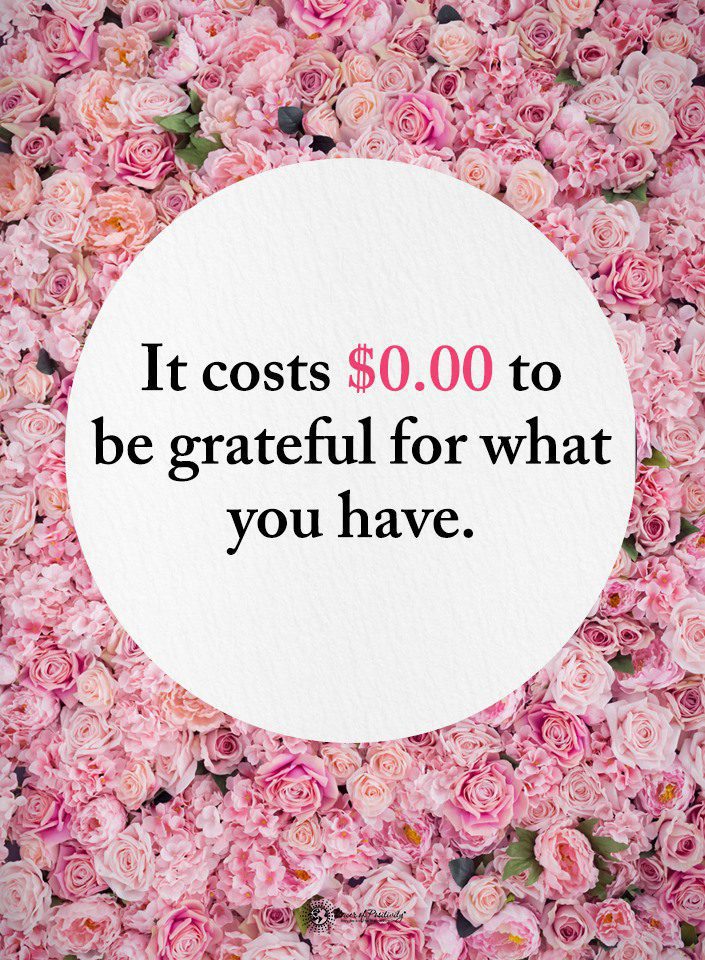Do you ever feel like your mental health is slipping in multiple different areas at once? Have you ever wondered if there was a way to address those problems cohesively? The answer might lie in simply being thankful.
Sure, it sounds condescending, but gratitude has always been a wonderful booster for psychological wellbeing. Just try it and see! Here are 14 mental health benefits of showing gratitude and being thankful.
1. It Makes You More Optimistic
The more grateful you are, the more likely you are to shift your thoughts towards positivity. Your thoughts will slowly and steadily begin to automatically seek out the positive things in life that you can be grateful for, effectively retraining your brain.
This means that showing gratitude changes your perspective, allowing you to see silver linings before you lose yourself in grey clouds. That’s powerful stuff!
2. It Relieves Stress
Being grateful can benefit positive thinking by helping to regulate your stress levels. A study found that when experiencing gratefulness, people feel a variety of surprising results, proving that being thankful:
- Reduces heart rate
- Creates a calmer mind frame
- Reduces anxiety
- Creates a sedative state
- Relaxes anxious brain communication
On the flip side, experiencing feelings of resentment would have the opposite effects, worsening stress levels all around. The research suggested even further that directing your attention and concentration onto things to be grateful for can be enough to relieve the worst of stress in difficult situations, giving you better positive thinking.
3. It Reduces Your Risk Of Depression
When you’re grateful, you’re not necessarily being unrealistic. Instead, you’re focusing on the blessings. You’re telling yourself that the world isn’t terrible and not everything is bad. As a result, you feel better overall, and the way you think can change.
Research suggests that this creates a significant ripple effect. It helps you keep working towards your goals, remaining motivated through trials and tribulations. All combined, this reduces your risk of developing depression at all, which is an immeasurable mental health benefit!
4. Showing Gratitude Gives You A Positive Outlook
The human brain typically has what experts call a “negativity bias”, which is a natural tendency to focus on the negative in life. It also means you’re more likely to focus on what you lack and the potential trials you face ahead. This is a completely normal way of thinking, sadly, as the brain attunes to this perspective quickly as you grow up.
But being grateful can turn these behaviors towards positive thinking, and all you have to do is a little bit of practice. The act of writing daily or even weekly logs of things you’re grateful for can lead to better mood and reduced symptoms of both mental and physical health. More importantly, it shifts your perspective, moving your mind towards the positive.
5. It Makes You More Altruistic
Did you know that being grateful for your life can also make you want to give more to others, especially those in need? To better understand this, we can take a closer look at a rather interesting study conducted using the analysis of brain activity via an MRI scanner. Here are some pointers from the results:
- The ventromedial prefrontal cortex, which is the part of the brain responsible for risk versus reward processing, lit up when participants experienced feelings of altruism and gratitude.
- At the beginning of the study, most participants experienced higher reward values from gratitude than altruism.
- After three weeks of gratitude journaling, the value of altruism as a reward increased significantly in the ventromedial prefrontal cortex, and in most participants, was valued more than gratitude.
This study suggests, then, that practicing gratitude can make altruism more rewarding to you than continuing to receive more benefits, yourself. Your entire perspective just changes!
6. It Makes You Less Materialistic
Materialism isn’t always a negative trait, but most would likely agree that isn’t among the best. There’s nothing wrong with having some material success as a goal, but problems can arise when you focus too much on material objects over everything else.
If you’re looking for a way to reduce those tendencies, showing gratitude can help! Participating in acts of kindness while keeping a gratitude journal can reduce your interest in materialism, moving items and objects further down the list of your priorities, according to research.
7. It Boosts Your Self-Esteem
Do you often feel unconfident about your abilities and skills? Being grateful for them can help raise your self-esteem, according to studies. It’s a bit of a self-fulfilling prophecy. The more positive you are regarding what you can do, the more likely you are to manifest that positivity. This both helps you to improve and keeps your self-esteem in the present moment high. This can also apply to:
- Your appearance
- Job performance
- Personality
- Lifeskills
- Your habits
8. It Can Help You Recover From Substance Addiction
Addiction is an incredibly difficult thing to overcome. Aside from its obvious physical effects, it takes a toll on your mentally, causing:
- Feelings of guilt or shame regarding your addiction
- Inability to break out of the cycle of addiction
- Perceptions of pointlessness at the concept of breaking addiction
- Increased likelihood of relapse due to difficulty with coping emotionally
- Overwhelmed emotions regarding the knowledge of the difficulty of addiction recovery
If you’re trying to fight substance abuse or are recovering from substance abuse, then gratitude may help you in your journey. It allows you to develop positive traits, strengths, and resources that motivate you towards a better life while boosting your desire to see your journey through to the end.
Do note that gratitude alone cannot fight substance abuse or facilitate its recovery. You are encouraged to seek professional help in the process.
9. Showing Gratitude Makes You Happier In The Long-Run
Did you know that the act of keeping a gratitude journal can make you significantly happier in the long run? Studies have indicated that you can find your long-term happiness boosted by more than 10%!
But why does this happen? Well, taking notice of the good in life allows you to facilitate positive thinking. You feel happier when you’re aware of the things that can make you happy.
10. It Helps You Cope With Emotional Trauma
Emotional trauma is hard to fight. Your brain has formed links between certain triggers and danger, causing strong, disproportionate, and even self-destructive reactions to those triggers. Whether in the form of depression or PTSD, emotional trauma is tough to handle.
The good news is that gratitude can help you in your recovery. Telling yourself about how thankful you are for your progress and being grateful for positive aspects of your life can be a fantastic coping mechanism that facilitates healing.
Once again, please note that gratitude alone is not a sufficient form of trauma recovery treatment. You are encouraged to seek professional help in working through trauma and all the complexities it entails.
11. It Boosts Social Support
When you are grateful, you have a brighter outlook on life that makes other people more likely to support you. You’re grateful for their company, and when you express that thanks, they feel appreciated and want to continue because they know their actions are positively impacting you.
This leads to increased social support, which doesn’t seem like a big deal. But social support is capable of boosting strength in tough times, reducing depression and stress levels, and reminding you that, no matter what, you’re not alone. These are important things to have in your life, and studies suggest the little gratitude that earns these benefits is more than worth giving.
12. It Reduces Suicidal Thoughts
Studies indicate that gratitude protects the brain front the worst of suicidal ideation. This is because it helps with factors like coping with difficult times, reduces depression, and boosts positive thinking. When you are at your lowest, being grateful can be all you need to pull you back to safety. It’s really remarkable to think about.
It bears repeating that severe suicidal ideation without treatment is dangerous, and gratitude alone should not be considered a sufficient counter-measure to it. Seek help immediately if you feel that you may attempt suicide or cannot stop thinking about your suicidal desire.
13. It Improves Spiritualism
For many people, spiritualism is an inherent part of their mental health. If that’s not the case for you, that’s completely valid. But if it is, then read on!
Many people suffer from feeling like they have lost aspects of their spirituality or become disconnected from their faith. It can weigh negatively on your mental health if you perceive this to be a problem, as you may feel guilty for “abandoning” a faith you’ve always upheld.
Gratitude can help you rise up from a spiritual “funk”, say studies. If you worry that you’ve become more “worldly”, remembering the things you are grateful for and expressing thanks to figures of your faith for that can help you get back in touch with your spirituality.
14. It Boosts Work-Based Mental Health
There’s no denying that work can take a toll on just about anyone, but being grateful might be the main way to overcome the worst mental detriment from a difficult job. Here are some things that being thankful in the workplace can help:
· Purpose
It’s hard to continue working when you feel like you have no purpose. Being grateful may be able to increase feelings of fulfillment and satisfaction during your career. When you’re grateful, the meaning is easier to find as you apply your strengths, abilities, and positive thinking to achieving career goals.
· Patience
Economic decision-making can be very crucial, and it takes a strong mind to hold out to just the right moment to make positive decisions with decreased pressure. To say no to short-term gratification in favor of long-term results, practice gratitude!
· Overall Psychological Health
If you’re experiencing stress from such issues, expressing your thanks in workplace environments and being grateful for your work can protect you from the worst work negativity, including common side effects of more mentally taxing jobs.
Final Thoughts On Some Mental Health Benefits Of Showing Gratitude And Being Thankful
It can be difficult to express and show gratitude every single day, but it’s a habit that you can learn to build. It takes time and effort, but work on your thankfulness and it will begin to come more naturally to you. Once gratitude is an automatic habit, you’ll be reaping the mental health benefits constantly!

















 Community
Community

